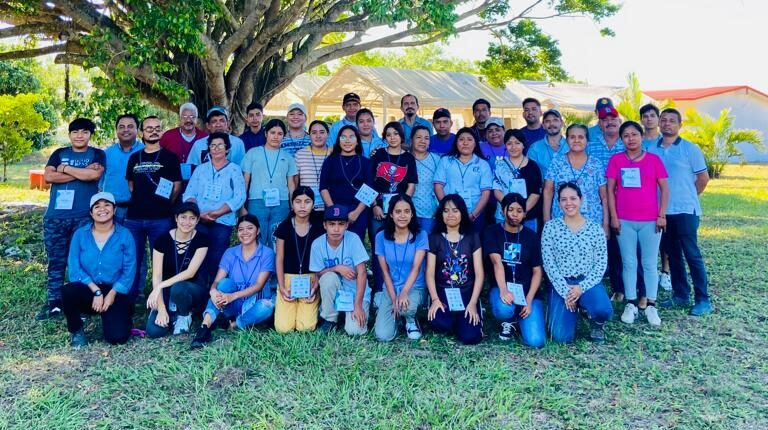On 22, 23 and 24 September 2023, the opening of the Escuela Xalag Chúchut school took place, with the participation of GPG México staff, local and school authorities from the Países Bajos community.
The Escuela Xalag Chúchut School is aimed at community leaders who have a special interest in eco-technologies related to water. This school is a response to the needs of the 13 neighbouring communities of the Tuxpan Combined Cycle Power Plant III and IV, identified in the 2022 “Participatory Community Study”, in which water resources were one of the main challenges for the communities, ranging from access to their care.
This project aims to strengthen the culture of water care , collection, filtration and remediation. Therefore, it is associated with the participation of organisations specialised in municipal water management and the installation of eco-technologies, such as: Red de Ecotecnologías de México, Grupo Interdisciplinario de Tecnología Rural Apropiada, A.C. (GIRA), Cántaro Azul, Isla Urbana, SARAR, Transformación and Arquitectura Cruda. In addition, an attempt is being made to develop a collective overview of water stress in the region, with the participation of experts such as the National Commission for Protected Areas, the Universidad Veracruzana, the Instituto Tecnológico de Álamo-Temapache and the Centro de Estudios Tecnológicos del Mar #20.
Based on GPG Mexico’s Community Relationship Model of experiential learning, the school offers a multidisciplinary approach to the practise and theory of eco-technological knowledge, providing tools through the analysis of the social, economic, cultural and political reality of the water problem in the Tuxpan River basin (Veracruz, Mexico), without ignoring the wisdom of communities in regards to their experience of managing water.
The Escuela Xalag Chúchut project is divided into six modules taught in the facilities of the Telebachillerato in the community of Países Bajos and the Nakú Kayám turtle camp in the community of Villamar, where eco-technologies such as rainwater harvesting systems, dry toilets and biofilters are to be installed when the different modules are completed.
The GPG Mexico team was present at the inauguration of the Escuela Xalag Xhúchut with Ramadán Salazar González, Corporate Social Responsibility and Communications Officer GPG Latam, and Francisco José Cerezo Herrera, Deputy Head of Technical Control of the Tuxpan Combined Cycle Power Plant III & IV. The event consisted of two modules, held at the end of September and beginning of October, during which a variety of activities were carried out.
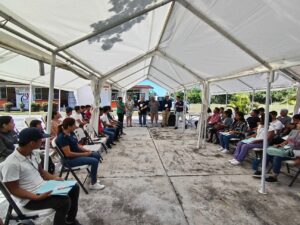
Module I was attended by 43 pupils and students with different profiles: secondary school students (telebachillerato), university graduates (engineering and bachelor’s degrees), bachelor’s and master’s graduates, and adults, mainly residents of the kilometres route (Linda Vista, Villamar, Benito Juárez, Práxedis Guerrero, Países Bajos and Nicolas Bravo) who, after this first module, have shown interest and to be participatory, and are thinking collectively about community water management.
Blanca Mónica Zapata Nájera, director of the National Commission of Natural Protected Areas (CONANP), of the Flora and Fauna Protection Area of the Lobos-Tuxpan Reef System, Fernando Sotelo Ginner, academic from the Instituto Tecnológico Superior de Álamo Temapache and the Centro de Estudios Tecnológicos del Mar #20, and Manuel Agustín Acevedo, professor of the Geographic Information Systems Area of the Centro de Estudios Tecnológicos del Mar #20, were present to finalise the first module and spoke about topics such as climate change and water stress in the northern region of Veracruz. Their contributions helped demystify ideas about the use of groundwater in the region and provide a comprehensive view of the water problem.
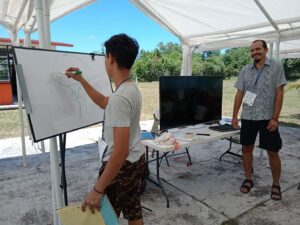
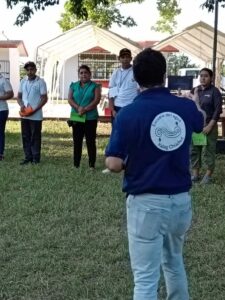
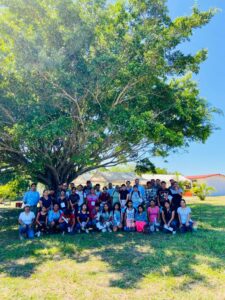
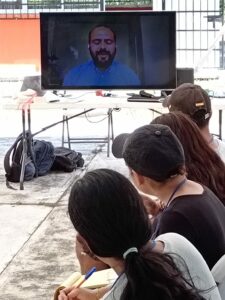
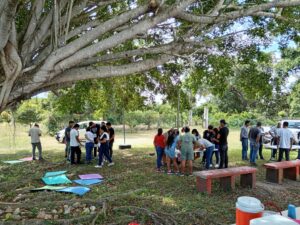
Module II of the Escuela Xalag Chúchuta took place on 6, 7 and 8 October with the participation of the organisation Cántaro Azul, and dealt with the topic of “Water Administration in Mexico and community management”. During this module, eco-technology for purifying rainwater was also installed in the facilities of the Telebachillerato, Países Bajos.
Last but not least, after the opening ceremony, , Francisco Cerezo spoke about Water management in combined cycle power plants, followed by a presentation by Dr. Víctor Berrueta Noriega, member of GIRA, Alfredo Fuentes Gutiérrez, research professor at the Department of Ecotechnologies of UNAM, Morelia Campus, and Jorge Adrián Ortiz Moreno, member of the Mexican Eco-technologies Network, who spoke about the topic of eco-technologies as a strategy to promote sustainable development in Mexico, especially in rural and urban areas.

